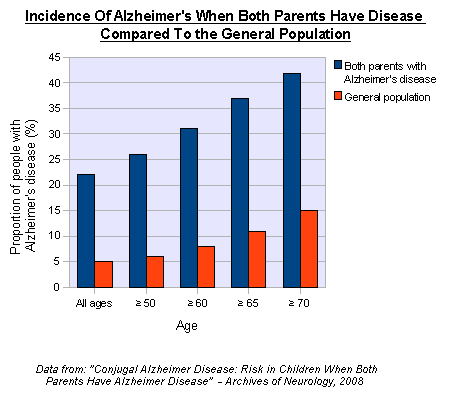WATCH...
as families of Alzheimer's and dementia victims share their stories, and send out a universal call to action: a plea to support Alzheimer's patients, along with the research that may eventually save their lives.
ALZHEIMER'S: EVERY MINUTE COUNTS - Preview [V1.1]



BIOTECHNOLOGY'S ROLE IN THE CURE FOR
NEURODEGENERATIVE DISEASE
UNDERSTANDING
NEURODEGENERATIVE DISEASE
'Neurodegenerative' is a broad term applied to a wide range of conditions that are predominantly characterized by the loss of nerve structure and function. [S1.2]
'Neuro-', referring to the nerves or nervous system, 'degenerative', meaning decline, or progressive damage. [S1.1]
neurodegenerative disease for centuries, they have only just begun to pinpoint the causes with the help of modern diagnostic tools and improved investigative approaches. Genetic components, trauma, viral infections, buildup of toxins in the cerebrum, lack of nervous stimulation, and general decline in brain function due to age have all been known to be likely contributing factors to the initiation of nervous degeneration. [S1.2, S1.3, S1.4]
Although physicians and scientists have been studying
EXAMPLES OF
NEURODEGENERATIVE DISEASE
Though there exists a wide variety of disorders that are classified as neurodegenerative, some well-known, well-studied examples include the following: [S1.3]
WHY IS NEURODEGENERATIVE DISEASE
SIGNIFICANT?
Unfortunately, neurodegenerative disease is a growing concern in the medical community. As the predicted lifespan continues to grow with each generation, we see the number of people afflicted with the chronic deterioration of the nervous system rising simultaneously. [S1.5]
As of 2016, an estimated 5.4 million U.S. citizens alone are living with Alzheimer's, a well-known neurodegenerative condition currently listed as the sixth leading cause of death in the United States. [S1.6, S1.7]
Statistics regarding Parkinson's Disease show that PD affects approximately 1 million
in the U.S., with over 60,000 new cases diagnosed each year. [S1.8, S1.9]
About 1 in every 10,000 Americans are believed to have developed or be at risk of developing Huntington's Disease. [S2.1]
The ALS Association states that as many as 20,000 U.S. citizens are living with amyotrophic lateral sclerosis. [S2.2]
It was determined that about 400,000 American people living today have been or will be diagnosed with Multiple Sclerosis. [S2.3]
WHAT ARE THE
SOLUTIONS?
For many years following the discovery of neurodegenerative diseases, such afflictions were believed to be incurable. Research was mainly focused around alleviating the debilitating symptoms of these disorders, and later, prolonging and improving the quality of life of patients plagued with neurodegenerative disease. However, new research has given hope to the victims of neurodegenerative disease and their families. Opening doors to those whose conditions were formerly considered irremediable, stem cell treatments, regenerative therapies, and advanced preventive measures may provide a means by which patients can reclaim their optimal neural function.
WATCH...
as researcher Valina Dawson introduces the Neuroregeneration Program at Johns Hopkins' Institute for Cell Engineering, where scientists study causes and potential treatments for neurodegenerative conditions.
The Neuroregeneration Program at Johns Hopkins’ Institute for Cell Engineering [V1.2]

Click 'Background' to learn more about the innovative projects and studies that strive to find a lasting cure for the myriad of known neurodegenerative diseases.
UNDERSTANDING NEURODEGENERATIVE DISEASE
[I2.8]


We have an unprecedented opportunity to make new genomic discoveries in Alzheimer's Disease and dementia, which in turn will inform us about other neurodegenerative diseases such as ALS, Parkinson's Disease, and Huntington's Disease.
-Richard Meyers, PhD
RECENT UPDATES
GET THE LATEST NEWS
FACTS AND FIGURES OF
NEURODEGENERATIVE DISEASE












Hover over left and right areas of gallery to view more images. Click any image to learn more.
Alzheimer's disease, according to the Alzheimer's Association, "is a type of dementia that causes problems with memory, thinking and behavior. Symptoms usually develop slowly and get worse over time, becoming severe enough to interfere with daily tasks." [S7.5]
ALZHEIMER'S DISEASE
Did You Know...?


Healthy Brain vs. Brain with Alzheimer's


HUNTINGTON'S DISEASE
The Huntington's Disease Society of America states that Huntington's Disease "is a fatal genetic disorder that causes the progressive breakdown of nerve cells in the brain." [S7.7]
Did You Know...?
Normal vs. Huntington's Neural Synapse


AMYOTROPHIC LATERAL SCLEROSIS
The ALS Association define amyotrophic lateral sclerosis as "a progressive neurodegenerative disease that affects nerve cells in the brain and the spinal cord." They also add that "[t]he progressive degeneration of the motor neurons in ALS eventually leads to [the victim's] death." [S7.8]
More About ALS
Normal vs. ALS Neurons and Muscles


MULTIPLE SCLEROSIS
The National Multiple Sclerosis Society states that multiple sclerosis usually occurs when "an abnormal response of the body’s immune system is directed against the central nervous system...which is made up of the brain, spinal cord and optic nerves." [S7.9]
More About MS
Normal Brain vs. MS Brain


[I1.1]
[I1.2]
[I1.3]
[I1.4]
[I1.5]
[I1.6]
[I1.7]
[I1.8]
[I1.9]
[I2.1]
PARKINSON'S DISEASE
The National Parkinson's Foundation describes Parkinson's as a disorder during which "a person's brain slowly stops producing a neurotransmitter called dopamine." They go on to add that "[w]ith less and less dopamine, a person has less and less ability to regulate their movements, body and emotions." [S7.6]
Symptoms of Parkinson's
Facts Regarding Parkinson's Disease
[H1.1]

